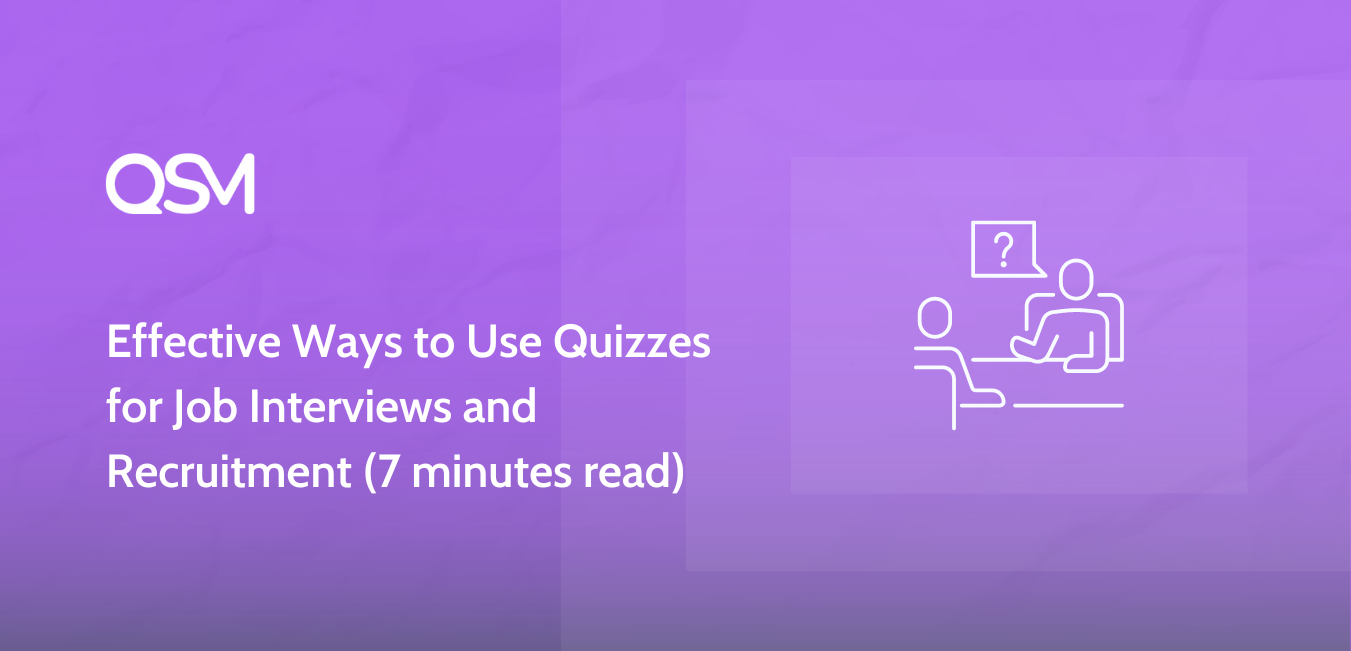Quizzes for job interviews and recruitment are the best way to assess your potential interns, employees, and workers. There are different types of online test for recruitment that allows global access to a job profile.
Employers use assessment tests during recruitment to evaluate your aptitude, personality, skills, and ability to perform tasks. Assessment tests aid in determining your suitability for a role because they better predict your readiness than prior experiences and accomplishments.
In this blog, we will dissect the working of a job interview quiz or any online test for recruitment.
We would also discuss what are the pros and cons of having an online test for recruitment and likewise, we will learn some practices that can help you ace your quizzes for job interviews and recruitment. Check out a sample job application form created using the QSM plugin:
Key highlights of the blog:
- Why Use Quizzes for Job Interviews and Recruitment?
- Types of Quizzes to Use in Job Interviews and Recruitment
- Advantages of Using Quizzes for Job Interviews and Recruitment
- How to Design Effective Quizzes in Job Interviews and Recruitment?
- Best Practices for Using Quizzes for Job Interviews and Recruitment
- FAQS
Why Use Quizzes for Job Interviews and Recruitment?
Job interview quizzes are usually made to understand the mental ability and cognitive skills of a person before they are prescribed for the actual hiring process.
These quizzes for job interviews and recruitment may or may not be objectively planned according to a job role or a position. Many companies tend to keep their recruitment quizzes general so as to cater to more applicants. However, you can also opt for a role-specific quiz.

It is just as important for businesses to retain talent and reduce turnover as it is to hire the right candidate. You can screen candidates more efficiently for aptitude and personality, as well as determine whether a candidate is likely to stay in the role and fit in with the company culture, using pre-employment testing and assessment.
Many factors can be considered when determining whether a candidate is qualified for a position, including a passion for learning, overall ambition, ownership and initiative, empathy, communication skills, critical thinking skills, collaboration skills, honesty, motivation, and curiosity. It can be difficult to screen for these skills during a standard face-to-face interview.
Types of Quizzes to Use in Job Interviews and Recruitment
There are different types of quizzes for job interviews and recruitment. For your WordPress website, you can make use of a versatile quiz plugin like QSM for creating these quizzes. Types of quizzes for job interviews and recruitment are:
- Skills-based Quizzes: These quizzes are, as the name suggests, built to assess the skill set of the applicants. These are objective quizzes meaning designed specifically for a job role. Skill-based quizzes generally use MCQ type of questions or demand a particular assignment be completed. This could also be a form type.
- Personality Quizzes: Much like any other personality quiz, these quizzes judge the person’s ability to mingle with the work environment or culture that is currently accepted in a particular company. Personality quizzes are a great way to understand an applicant’s emotional quotient and their horizons.
- Situational judgment quizzes: These quizzes are created on the basis of situations that a potential employee might have to face during their work term in the office. Such quizzes are very engaging and actually help employers assess their problem-solving skills in an official setup.
- Cognitive ability quizzes: Questions about cognitive ability are present in all quizzes for job interviews and recruitment. Such quizzes provide a clear picture of what is the level of a person’s ability to judge and assess a given task and complete it efficiently.
Advantages of Using Quizzes for Job Interviews and Recruitment
#1 Objective evaluation of candidates
Tests for job interviews can be an eye-opener for both applicants and employers. And using a pre-set data analyzer, here quizzes, can help this process in a long run, to work smoothly.
Quizzes for Job interviews and recruitment can provide you with standardized, useful insights into candidates while also forecasting job performance and company fit. By utilizing this data to identify and hire the right candidate, you will improve your teams’ overall productivity and effectiveness.
Quizzes for job interviews and recruitment, as opposed to face-to-face interviews, allow you to assess a wide range of applicable skills and personality traits. It enables you to evaluate various candidate characteristics such as cognitive ability, strategic thinking, subject-area knowledge, confidence, problem-solving ability, and leadership ability.

#2 Time-efficient hiring process
There is no doubt that a quiz or a form that is created for the process of hiring eases your way through it. But another very important aspect is its efficiency with time.
Once you have sanctioned a few quizzes for different categories of job roles, your job is half done. This means your time is half saved! You can easily get to learn about the candidates’ abilities and skills instead of their graduation certificates. You can skip through the long list of applicants by just analyzing their scores for the skill-based quizzes or cognitive quizzes.
#3 Improved candidate experience
We agree that face-to-face interviews provide a better understanding of a person’s upkeep and behavior. And the motive for using quizzes for job interviews and recruitment is not to terminate those interviews, instead, it is to provide a first-hand experience about the candidate’s value proposition.
With a resume or a CV, you cannot actually assess whether a candidate is fit for the job’s responsibility and has the target skill set, therefore different types of quizzes are encouraged to analyze a candidate’s abilities. These quizzes also provide a better picture for the candidates as they are posed with questions of practical importance.
#4 Reduction of unconscious bias
Everyone receives the same pre-employment test. It means that everyone has an equal opportunity, rather than certain candidates being given preferential treatment. Unstructured interviews and screening calls are two examples of this. Your recruiters may inadvertently spend more time questioning one candidate than another.
Personal opinion and bias can easily seep into the recruitment process, so tests can help remove that bias and level the playing field for everyone. There’s no getting around the results because everyone had the same opportunity to complete the test to the best of their ability.
How to Design Effective Quizzes in Job Interviews and Recruitment?
#1 Identifying the skill requirements
To be successful in the role at hand, the best candidate must have a specific skill set. When you define these skills, you will be able to design assessment tests with them in mind from the start.
So, take some time to make a list of the relevant skills that an ideal candidate must demonstrate. Those who are familiar with the role will find it easier to list their skills. As a result, make sure to work with the appropriate teams.
For example, suppose you are looking for a copywriter. Your marketing team could assist in developing specific questions based on the skills a copywriter must use on a daily basis, or you could create a test project.
It could be a smaller piece of copywriting based on the type of work required for the role with specific parameters. For this role, you may need a person with writing experience or a particular major. Similarly, you can list down the skills as
- Educational Requirements
- Qualifications
- Work Experience
- Communication Skills
- Problem-Solving Skills
#2 Creating questions to assess these skills
Once you have identified what skills are required for a job role, next step is to create a questionnaire based on that. There can be hard skills or soft skills that you might want to learn or assess from an applicant, so working through that with questions is necessary.

For instance, if you want to assess the leadership qualities of the candidates, for this you could create a situation-based questionnaire. Some examples could be:
Situation: You are in the office when your junior asks you to learn about a particularly important document but you have meetings lined up back and forth, how would you manage to tend to his/her query at the earliest?
Situation: While you are in a meeting, one of your fellow employees mistakenly told the clients about a classified project/stakes. How would you deal with this situation?
Likewise, you could add more real-life situations to your questions. Other than these, you could opt for simple cognitive skill questions in quizzes for job interviews and recruitment, like:
- What aspects of your current and previous work experience make you a good fit for our position?
- What has been the most difficult challenge you’ve faced in your current or previous role? How did you overcome this obstacle? What was the end result?
- What are your professional development objectives? How will this job help you achieve your professional development objectives?
- What does your ideal manager reflect? Have you ever had a manager who was close to or exactly matched this ideal?
- What kind of workplace do you prefer? What is your management style?
- In general, how do you manage projects and prioritize tasks?
#3 Ensuring the quizzes are fair and unbiased
If your company does not use employment questionnaires, the only information you have about candidates is what is on their CVs. Because more than 75% of job candidates lie on their CVs, reading one is unlikely to give you a good sense of the candidate’s skills.
However, if you use quizzes for job interviews and recruitment, you will receive useful information about your candidates that will assist you in properly preparing for the interviews.
You can see how well they perform in specific areas and use specific skills, allowing you to tailor your questions based on their responses, challenges, or weaknesses.
This substantially decreases the chances of unintentional biases and provides fair competition.
#4 Choosing the appropriate format and platform for the quiz
Once you have made sure your questionnaire is set, you can continue to create a quiz. There are ample options to choose from when it comes to creating online WordPress quizzes, however, choosing a versatile option is the most viable.
Quiz and Survey Master plugin for WordPress is one such versatile quiz plugin that can cater to all check-list. There are more than just quizzes when it comes to the recruitment process; there are forms, questionnaires, feedback, quizzes, and sometimes even surveys.
Therefore, choosing an appropriate format and platform for the quiz is essential. When choosing QSM, you get customizable themes, enriching Addons, a simple user interface to work with, and a lot more. In fact, you can create unlimited quizzes for free using the QSM plugin!
Learn how to create quizzes using the QSM plugin
Best Practices for Using Quizzes for Job Interviews and Recruitment
Some of the best practices for using quizzes for job interviews and recruitment are:
#1 Communicating the purpose
When you create a job opening, you should already have a list of skills that your future employee should have. Use that list to select quizzes for job interviews and recruitment, and match each skill required for the job with the quizzes.
If you’re hiring a software developer to work with Python, for example, give them a Python test. However, you should also administer personality, emotional intelligence, and ethics tests to ensure that you hire the best person for your organization.

#2 Providing clear instructions
Although pre-employment tests are a valuable tool in the hiring process, they are not a panacea that will solve all of your recruitment issues. Your hiring manager must communicate with your candidates at each stage of the process so that they know what to expect.
Setting the right expectations from the start will ensure that they always know where they are in the process and what else awaits them. So, don’t forget to fully communicate with your candidates and provide a positive experience.
#3 Results are a part of the evaluation process
Ensure that everyone on your hiring team understands when it is appropriate to test job applicants and the limitations of any tests. Pre-employment testing can benefit your company as long as hiring managers understand and adhere to specific procedures for each hire,
Quiz results may or may not be disclosed simultaneously. To cater to the aspect of confidentiality for an organization as well as the recruitment process, the results should be kept zipped until all applicants have been assessed. Thus making them a part of the evaluation process.

#4 Maintaining confidentiality
In a hiring process, confidentiality becomes the most important in quizzes for job interviews and recruitment. It is essential for employers to keep these results free of any unconscious biases and complexities.
To avoid bias, carefully select testing protocols. Otherwise, you risk violating federal anti-discrimination laws by excluding people from a specific group disproportionately.
FAQS
What are the 4 best interview practices?
1. Communicating the purpose and format of the quiz to candidates
2. Providing clear instructions and guidelines for completing the quiz
3. Ensuring that the quiz results are used as one part of the overall evaluation process
4. Maintaining confidentiality and security of quiz results
What are the interview questions for recruitment?
1. What aspects of your current and previous work experience make you a good fit for our position?
2. What has been the most difficult challenge you’ve faced in your current or previous role? How did you overcome this obstacle? What was the end result?
3. What are your professional development objectives? How will this job help you achieve your professional development objectives?
4. What does your ideal manager reflect? Have you ever had a manager who was close to or exactly matched this ideal?
5. What kind of workplace do you prefer? What is your management style?
6. In general, how do you manage projects and prioritize tasks?
Conclusion
With this, we close the blog for quizzes for job interviews and recruitment. We learned that using quizzes for testing skills can provide an improved candidate experience and keep the hiring process free from unconscious biases.
Creating quizzes for job interviews efficiently means keeping clear dialogue between the applicants and the posed questions, maintaining the confidentiality of the results, and keeping the quiz tests to the point. These practices can help you create effective quizzes for job interviews and recruitment.
QSM is a highly versatile plugin that helps in easing out the hiring process with its completely customizable quizzes and surveys. Even though QSM is a free-of-cost WordPress quiz plugin, you can make the most of it by grabbing the QSM Pro bundle of Addons. With the Pro Bundle, you get:
- Email Marketing Integrations (Mailchimp, convertkit and more)
- Zapier Integration
- Advanced Timer
- Export Results
- Google Sheet Connector
- Save and Resume and all 30+ addons!




